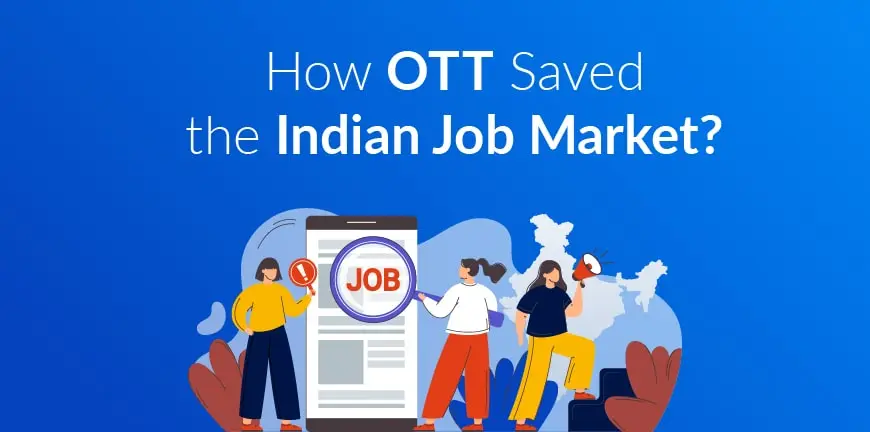
What Is Compliance in the Garment Industry?
16/07/2024
Top 8 Benefits of Hiring Apprentices for Employers
16/07/2024The Covid-19 pandemic brought families together in ways like never before, ensuring that people get time to talk and interact with one another after and even during work. The lockdown meant that everyone would be restricted to their homes. And had to find a way to spend time together even while the parents were working, and the children were learning. So, people bonded over family shows.
It was a once-in-a-lifetime event, and people turned to OTT platforms to consume content, and the TV, not the mobile, became the centerpiece of households in most families again. This time, the working members of the family also took breaks away from their work phones or laptops to rejuvenate themselves. Covid-19 pandemic has significantly accelerated the adoption of OTT (Over-the-Top) services in India:
1. Increased Viewership and Subscriptions
The nationwide lockdowns and closure of movie theaters led to a surge in demand for OTT platforms, as people sought entertainment options at home. This resulted in a significant increase in OTT viewership and subscriptions across platforms like Netflix, Amazon Prime Video, Disney+ Hotstar, etc.
2. Expansion of OTT User Base
The pandemic has expanded the OTT user base in India, with increased adoption even in tier-II and tier-III cities. This growth has been driven by factors like affordable data plans, availability of regional content, and the convenience of on-demand viewing.
3. Shift from Traditional TV
OTT platforms started to show content that was on TV channels only, and this time in high definition too. It became the perfect way for families, where a few members were working, to catch up on their favorite reality shows or serials. The convenience of being able to pause and play at will became an attraction.
OTT platforms are also contributing significantly to India’s revenue growth in several ways. Indian OTT platforms witnessed a 194% increase in revenue from international viewers in the last two years, indicating growing global interest in Indian content. This has helped boost overall revenue for the industry. OTT platforms in India have captured about 7-9% of the entertainment industry’s share and revenue. As the industry continues to grow, its contribution to overall revenue is expected to rise further. The success of Indian OTT platforms has had a positive impact on jobs in several industries.
Movies
OTT platforms have provided opportunities for creators and artists. Many have reclaimed their place in the spotlight, earning revenue from their work. Regional language content is expected to account for 45% of total OTT content in India by 2023, up from 30% in 2020. OTT platforms are investing heavily in local language content too, meeting the needs of the diverse Indian audience across states speaking different languages. This will increase the number of jobs in content creation and translation for regional languages. It will also lead to several jobs in the movie industry from script writing to cinematography to acting.
Music
The rise of music streaming platforms has allowed artists to interact directly with their audiences. The Covid-19 pandemic led to the cancellation of several tours and concerts. But it also gave rise to live streaming on OTT and specifically virtual concerts, where the artist could see how the crowd was interacting with them, aided by their responses. There has also been an increase in people using music streaming services. With steady increases every year, it was reported this June that Wynk Studio artists surpassed 1.7 billion streams already, which is a phenomenal number and an industry-leading milestone. What this means is more jobs for musicians, sound engineers, and more.
Entrepreneurship
While the major OTT players will continue to dominate, the market is also expected to see the entry of more niche and specialized platforms catering to specific audience segments and content preferences. An example is the rise of platforms like Kuku FM with a lot of audiobooks across Hindi and other regional languages, and Pratilipi and Soundcloud with its user-generated content, both being examples of OTT platforms uniquely catering to a certain audience. Kuku FM has grown in scale by 9X in 2023 alone. The growth of these platforms post-Covid has been phenomenal, providing jobs to several people in these companies in IT, operations, sales, marketing, and more.
Tourism
A 14x increase in payments to travel agencies post-Covid could well be attributed to OTT. What makes OTT relevant is how people are now traveling to unexplored locations for shooting their films, and that is leading to a rise in people exploring these locales for their next holiday. The increase in tourism post-Covid is remarkable and has rejuvenated the sector with several jobs in hospitality and related roles like stewards and stewardesses, chefs, gardeners, landscaping designers, and more.
Fashion
Indian fashion brands are racing ahead with 163% increase in sales globally. A part of this could be attributed to the ads streaming on OTT, particularly when we talk about online shopping events such as the Myntra End of Reason Sale. According to Hotstar, a brand named Mellora gained over 45,000 interests from its audience over just 8 days through targeted ads around Valentine’s Day.
EdTech
With over 4,450 EdTech startups in India today, the e-learning ecosystem has witnessed 51% more international sales for platforms. Byju’s, Unacademy, Toppr, and Vedantu are all good examples in EdTech that have been producing great content for OTT in varied demand modes. OTT educational content is helping the growth of jobs like authors, illustrators, instructional designers, academic writers and editors, and more.
FinTech
The pandemic also drove a surge in digital payments, which facilitated easier subscription and transaction processes for OTT platforms. This means that FinTech gets a boost, too. This means more people in domains like cybersecurity and business analysis. And a lot more people in customer support, too, if something goes wrong in a subscription and the bank is responsible.
VR and AR
The rollout of 5G, advancements in virtual reality (VR), and augmented reality (AR) technologies will further enhance the OTT viewing experience, making it more immersive and interactive. Generative AI content could also be integrated with other OTT content, improving speed and ensuring that a lot more content is made available to the user, and with AI becoming creative, there is less speculation of what it can do now. One can expect more jobs in AR and VR for artists and new roles in digital manipulation for those who know how to integrate AI into content.
Regulatory
The Indian government’s new guidelines for OTT platforms, which require self-classification of content based on age-appropriateness, are expected to bring more transparency and accountability to the industry. What this will also do is create more jobs in the regulatory domain, such as compliance experts and managers, legal counsels, etc., for the creators of OTT content.
Internet and Telecommunications
According to industry reports, the Indian OTT market is expected to reach $12.5 billion by 2030, up from $1.5 billion in 2021. This growth will be driven by increasing internet and smartphone penetration, as well as the rising demand for on-demand and personalized content. The growth of the internet due to demand for OTT in India has led to new jobs in internet and telecom companies. Some roles are telecom engineer, network manager, and field installation engineer.
OTT Has Saved the Indian Job Market
The Indian job market has been saved by several factors post-Covid. Government policy and relief measures, strengthening of the Make in India movement, and the return of several initiatives that had been stopped when the government was burdened by the pandemic all contributed fairly. There have been so many recent developments that it is easy to overlook the importance and relevance of OTT in the rejuvenation of the Indian job market. But as we can see, Netflix and other native OTT platforms like Zee Cinema, Wynk, Saavn, Hungama, and Gaana may have saved the day for us. And we hope this article helps you pause to think about it.
Contact Us For Business Enquiry

Rajkumar Shanmugam
Rajkumar Shanmugam is the Head of HR at ALP Consulting, bringing over 19 years of comprehensive HR leadership experience across India and international markets. His expertise spans talent acquisition, employee relations, performance management, compliance, and HR transformation. Rajkumar has a proven track record of driving people-centric initiatives, enhancing workplace culture, and aligning HR strategy with business goals. With extensive experience in US staffing operations and global mobility, he continues to lead organizational excellence through innovation and employee engagement.




